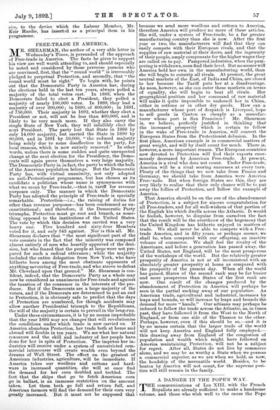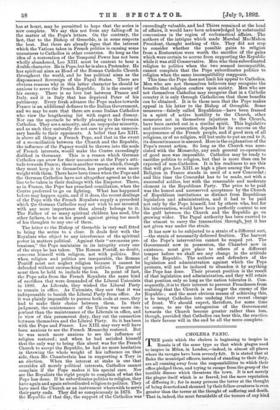A DANGER IN THE POPE'S WAY.
THE communications of Leo XIII. with the French Royalists are already sufficient to make a handsome volume, and those who wish well to the cause the Pope has at heart, may be permitted to hope that the series is now complete. We say this not from any falling-off in the matter of the Pope's letters. On the contrary, the kst, that to the Bishop of Grenoble, is in some respects the best. But there are already signs that the interest which the Vatican takes in French politics is causing some uneasiness to Catholics in other countries. So long as the idea of a restoration of the Temporal Power has not been wholly abandoned, Leo XIII. must be content to bear a double character. He is Pope, but he is also a Pretender. He has spiritual aims as Head of the Roman Catholic Church throughout the world, and he has political aims as the dispossessed Sovereign of the Papal States. There are obvious reasons why in this latter character he should be anxious to serve the French Republic. It is the enemy of his enemy. There is no love lost between France and Italy, and it is Italy that has deprived Peter of his patrimony. Every fresh advance the Pope makes towards France is an additional defiance to the Italian Government, and we may be sure that there are some Italian Catholics who view the lengthening list with regret and dismay. Nor can the spectacle be wholly pleasing to the German Catholics. They are a minority, and an unpopular minority, and as such they naturally do not care to give an unneces- sary handle to their opponents. A belief that Leo XIII. is above all things a French Pope, and that in the event of a reconciliation between the Church and the Republic, the influence of the Papacy would be thrown into the scale of French interests, would make the Centre exceedingly disliked in Germany. This is a reason which German Catholics can avow for their uneasiness at the Pope's atti- tude towards France; there is another reason, which, though they must keep it to themselves, has perhaps even more weight with them. There have been times when the Pope and the German Catholics have not altogether agreed as to the line to be taken in their dealings with the Emperor. There, as in France, the Pope has preached conciliation, when the Centre preferred to go on fighting. What has happened before may happen again, and if it does, the recent dealings of the Pope with the French Royalists supply a -precedent which the German Catholics may not wish to see invested with any more importance than already belongs to it. The Father of so many spiritual children has need, like other fathers, to be on his guard against giving too much of his thoughts to any one of them.
The letter to the Bishop of Grenoble is very well fitted to bring the series to a close. It deals first with the Royalists who object to any interference of the spiritual power in matters political. Against their "erroneous pre- tensions," the Pope maintains in its integrity every one of the steps he has taken. The Roman Pontiff, no doubt, concerns himself with religion, not with politics. But when religion and politics are inseparable, the Roman Pontiff must not neglect religion because it cannot be defended without encroaching upon politics. The greater must then be held to include the less. In point of fact, the Pope asks from the French Royalists the same kind of sacrifices that were demanded of the Liberal Unionists in 1886. As Liberals, they wished the Liberal Party to remain in office. As Unionists, they saw that it was indispensable to banish the Liberal Party from office. As it was plainly impossible to pursue both ends at once, they had to make their choice between them. In their judgment, the maintenance of the Union was more im- portant than the maintenance of the Liberals in office, and in view of this paramount duty, they cut the connection between themselves and the Liberal Party. So it has been with the Pope and France. Leo XIII. may very well have been anxious to see the French Monarchy restored. But he was much more anxious to see the influence of religion restored ; and when he had satisfied. himself that the only way to bring this about was for the French Church to accept the Republic, he had no more hesitation in throwing the whole weight of his influence on that side, than Mr. Chamberlain has in supporting a Tory in an election. When the interest at stake is one that overrides all merely political interests, Catholics cannot complain if the Pope makes it his special care. Nor are the Royalists the right people to complain of what the Pope has done. If he subordinates politics to religion, they have again and again subordinated religion to politics. They have used the Church as an instrument wherewith to serve theirparty ends. They did so conspicuously in 1873. To the Republic of that day, the support of the Catholics was exceedingly valuable, and had Thiers remained at the head of affairs, it would have been acknowledged by substantial concessions in the region of ecclesiastical affairs. The authors of the intrigue which made Marshal MacMahon President, thought nothing of this. They did not stop to consider whether the possible gains to religion from a Restoration were worth the sacrifice of the gains which were certain to accrue from supporting the Republic while it was still Conservative. Men who thus subordinated religion to politics when the two seemed incompatible, cannot complain that the Pope subordinates politics to religion when the same incompatibility reappears. This time the Pope does not limit his appeal to Catholics. Men who are not themselves believers may recognise the benefits that religion confers upon society. Men who are not themselves Catholics may recognise that in a Catholic country it is only through Catholicism that these benefits can be obtained. It is to these men that the Pope makes appeal in his letter to the Bishop of Greneble. Some measures—falsely called Republican—have been framed in a spirit of active hostility to the Church, other measures not in themselves injurious to the Church, have been carried out in a similar spirit. This legislative and executive persecution depends for its success on the acquiescence of the French people, and if good men of all religions, or of no religion, will but unite to put an end to it, its discontinuance is assured. Here is the explanation of the Pope's recent action. So long as the Church was asso- ciated with the Monarchy, any such general co-operation of good men was impossible. Catholics may be ready to sacrifice politics to religion, but that is more than can be expected of non-Catholics. It is his readiness to see this that will give Leo XIII. so high a place among the Popes. Religion in France stands in need of a new Concordat ; and this time the Concordat has to be made, not with a successful soldier, but with the reasonable and moderate element in the Republican Party. The price to be paid was the honest and unreserved acceptance by the Church of Republican institutions as distinct from Republican legislation and administration, and it had to be paid not only by the Pope himself, but by others who, but for his intervention, would have been perfectly content to see the gulf between the Church and the Republic go on growing wider. The Papal authority has been exerted to the utmost to carry the transaction .through but it has not given way under the strain.
It has now to be subjected to a strain of &different sort, —the strain of necessarily deferred fruition. The harvest of the Pope's intervention cannot be reaped yet. The Government now in possession, the Chamber now in existence, must give place to others of a different temper before we shall see any change in the attitude of the Republic. The authors and defenders . of the legislation and administration against which the Pope protests, will not be induced to alandon it by anything the Pope has done. Their present position is the result of that legislation and administration, and they will retain that position only so long as the nation tolerates it. Con- sequently, it is to their interest to prevent Frenchmen from realising that the Church is no longer the enemy of the Republic ; and the most obvious means of achieving this, is to tempt Catholics into undoing their *recent change of front. We should expect, therefore, for some time to come, to see the antagonism of the Government towards the Church become greater rather than less, though, provided that Catholics can bear this, the reaction in their favour will in th&end be all the wore complete.



















































 Previous page
Previous page